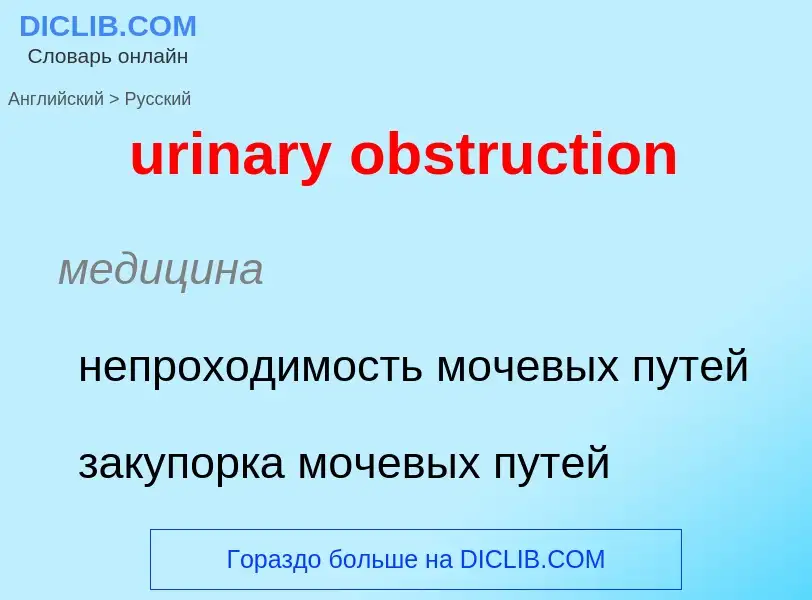Übersetzung und Analyse von Wörtern durch künstliche Intelligenz ChatGPT
Auf dieser Seite erhalten Sie eine detaillierte Analyse eines Wortes oder einer Phrase mithilfe der besten heute verfügbaren Technologie der künstlichen Intelligenz:
- wie das Wort verwendet wird
- Häufigkeit der Nutzung
- es wird häufiger in mündlicher oder schriftlicher Rede verwendet
- Wortübersetzungsoptionen
- Anwendungsbeispiele (mehrere Phrasen mit Übersetzung)
- Etymologie
urinary obstruction - Übersetzung nach russisch
медицина
непроходимость мочевых путей
закупорка мочевых путей
мочевая обструкция
общая лексика
ишурия
медицина
задержка мочи
ишурия (задержка мочи)
медицина
задержка мочи
ишурия
Definition
Wikipedia

Urinary retention is an inability to completely empty the bladder. Onset can be sudden or gradual. When of sudden onset, symptoms include an inability to urinate and lower abdominal pain. When of gradual onset, symptoms may include loss of bladder control, mild lower abdominal pain, and a weak urine stream. Those with long-term problems are at risk of urinary tract infections.
Causes include blockage of the urethra, nerve problems, certain medications, and weak bladder muscles. Blockage can be caused by benign prostatic hyperplasia (BPH), urethral strictures, bladder stones, a cystocele, constipation, or tumors. Nerve problems can occur from diabetes, trauma, spinal cord problems, stroke, or heavy metal poisoning. Medications that can cause problems include anticholinergics, antihistamines, tricyclic antidepressants, cyclobenzaprine, diazepam, nonsteroidal anti-inflammatory drugs (NSAID), amphetamines, and opioids. Diagnosis is typically based on measuring the amount of urine in the bladder after urinating.
Treatment is typically with a catheter either through the urethra or lower abdomen. Other treatments may include medication to decrease the size of the prostate, urethral dilation, a urethral stent, or surgery. Males are more often affected than females. In males over the age of 40 about 6 per 1,000 are affected a year. Among males over 80 this increases 30%.




